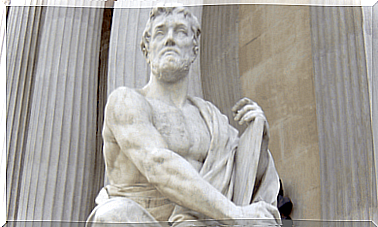The Conception Of The Absurd According To Albert Camus

Philosophy is a discipline devoted to answering questions, such as “what is life”, “what is the meaning of life” and “why are we here”. But Albert Camus had a clear answer: life is an absurdity, it has absolutely no meaning and the universe is totally indifferent to our existential questions.
Camus will qualify as absurd the distance between the search for meaning by human beings and the absolute indifference of the universe to this question. The absurd is the search for meaning in something that just doesn’t have it. In other words, human life is irrelevant to the vast universe around it.
In fact, if we think about it, humans are only in the universe for a tiny fraction of the time. 300,000 years out of the 13,700 million years of the universe.
All great actions and all great thoughts have ridiculous reasoning. Great works are often born around the corner or at the door of a restaurant. The absurd world derives its nobility, more than any other, from this miserable birth.

The myth of Sisyphus
The myth of Sisyphus goes that Sisyphus himself (Prometheus for Greek mythology) was punished by Zeus for stealing fire from the gods and giving it to men. His great cunning earned him eternal punishment : Sisyphus had to carry a huge stone up the hill to the top of a mountain.
Once at the top, the stone fell back and Sisyphus started to carry it again, again and again and again with the same result. And this for all eternity.
Through this myth, Camus wants to show how futile and empty human life is, based on repeated cycles (eating, sleeping, working)… In reality, we are all Sisyphus.
The absurd and suicide for Albert Camus
According to Camus, there are different ways of reacting to the absurdity of life. The first is the path to suicide. The person is overwhelmed by this vital absurdity which resembles a prison.
The loss of the supposed meaning of life, meaning which for some is their job, for others a loved one or even health, is reason enough to end life. If our reason for living disappears, it becomes our reason for dying.
The absurd and the existence of religions
Another way of reacting to the absurdity of existence is what Camus calls “philosophical suicide”. From philosophical suicide arises the idea that there are other metaphysical worlds, such as the paradise of Christians. Worlds in which we reincarnate.
In a way, these worlds free us from the thought that the present life is vain and meaningless. They take away the tension that we are experiencing in life today. Camus sees suicide as an effective (coherent), albeit somewhat cowardly, means of dealing with the absurdities of our existence.
Among metaphysical ideas, Camus also included utopias such as communism, which he called “religion without God”. Incidentally, Camus was expelled from the Communist Party of which he was a member after exposing this theory.

Albert Camus’ path of acceptance
For Albert Camus, simply accepting that life is absurd, that it has no meaning in the vast universe in which we live, while living with enthusiasm and passion is the only way to be in this world. The absurd does not have to be a test, it can also be a redeemer.
Acceptance is real rebellion against a meaningless life. For Camus, it is inconceivable that one could manage to construct a meaning in life before accepting that it does not have any.
This acceptance should dissuade us from such an undertaking, which would imply a reconciliation with our own nature. In his words: “I draw from the absurd three consequences which are my revolt, my freedom, my passion. By the only play of my conscience, I transform into a rule of life what was an invitation to death – and I refuse suicide. ”









